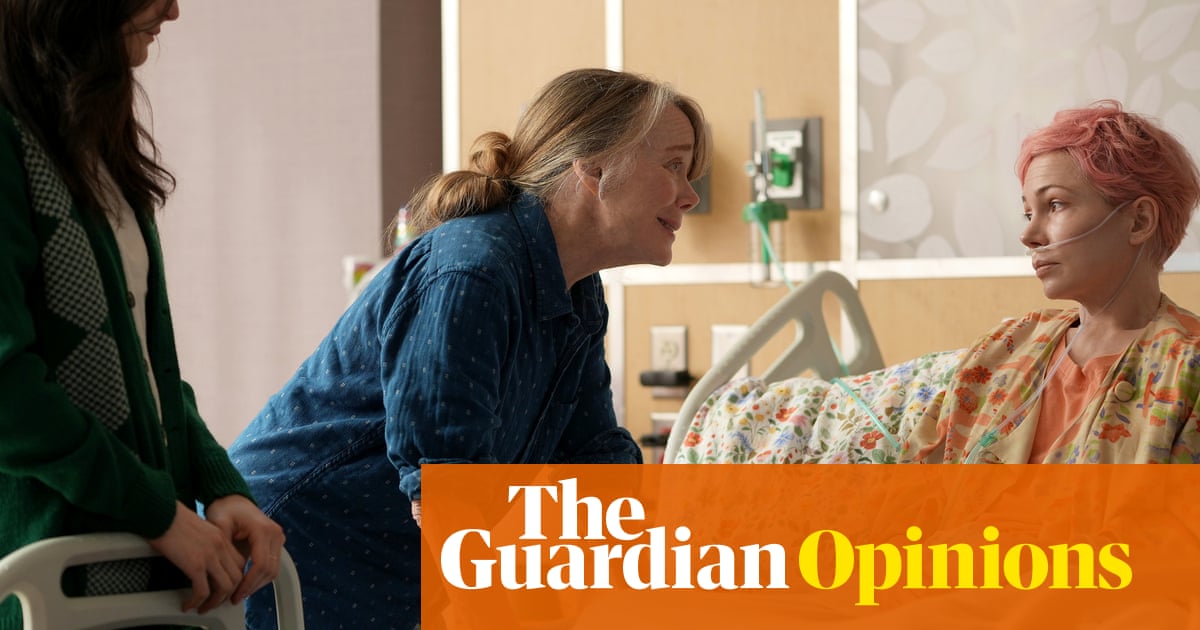When I started watching the Disney+ showDying for Sex, I was wary that the cancer storyline might hit a bit too close to home, after our teenage son was diagnosed with cancer in 2022.
The series follows Molly (Michelle Williams) who decides to leave her marriage and pursue sexual pleasure after being diagnosed with stage four cancer. And yet while it’s a difficult watch for obvious reasons, it wasn’t the “cancer stuff” that hit me where it hurts (everywhere); it was the portrayal of Nikki (Jenny Slate), Molly’s best friend, who takes over as carer when Molly leaves her husband. Nikki loses her job, her relationship, her house, her own mental health. And it’s very rare that we see the role of a carer highlighted in pop culture in this way.
When I took my son to emergency with odd symptoms, I initially assumed I’d miss a day or two of work. That was over two years ago. My work computer still has a tab open from Googling his symptoms and a Slack message saying I’d be offline for the rest of the day. I haven’t been back to the office since. And our landlord did what landlords do and landlorded so hard (increased our already staggeringly high rent) that we had to find affordable, wheelchair-accessible housing in the middle of a rental crisis while our lives imploded.
What Slate’s portrayal of Nikki does is give caregiving the value it deserves. We see the duality of care, how she does so imperfectly, but from a place of deep-seated love, not obligation or duty, and yet we also see the cracks form as she faces the reality of the tasks she has to perform.
One day at hospital, I had forgotten to put my mask on as I walked back inside. One of our son’s very senior doctors, who had only ever seen me from the bridge of my nose up, looked at my face, seemingly baffled, and said, looking right at me: “You’re not Natasha.” It took a while for me to realise there was a disconnect between how he imagined I looked versus how I actually looked without a mask. But before I registered that, there was a weird moment where it sounded like a prophecy. I was no longer me. Because that’s how I felt. On many days, as the physical and mental toll renders me a hollowed-out version of my former self, I hear his words echo back to me.You’re not Natasha.
We deal with everything by leaning into the absurdity of our situation. And although what we have to endure individually and collectively as a family is always too much on any given day, there is grace and humour and a ridiculous number of memes. And this, I suppose, is also what I loved about Molly and Nikki’s relationship. There is heartache and devastation but also beauty and laughter, and above all else, friendship. It’s hard to reconcile that while as parents we desperately wish we could give our son his health back, we also feel the very real privilege of the time we get to spend with him each day that we wouldn’t otherwise.
My husband and I do not possess any special qualities that have prepared us for our new roles as carers. We are not special. And this is the point.
There are 3 million unpaid carers in Australia. Caring for siblings, for parents, for friends, for children. Some caring for multiple people at the same time. Some do so out of choice and some have no choice. Some balance paid work, some do not. All are forced into systems that exist to seemingly help the chronically sick and disabled but actually create barriers to accessing help and place further burdens on carers and the people they care for. The 2024 Carer Wellbeing Survey found carers are being left behind in most of the key indicators of wellbeing including loneliness, psychological distress and financial hardship. Being a carer is not exceptional, though we may have to do so in exceptional circumstances.
When our son was first discharged from hospital, and the reality of his complex medical needs hit, I joined a Facebook group for carers, assuming I would find some tips and tricks. But instead, each day was a barrage of posts, desperate carers asking for help. “I’m at breaking point ... ”, “I don’t know what to do ... ”, “I can’t go on like this ...” It seemed I was doing everything right then: existing at breaking point was part of the job description.
There is a Post-it note on my laptop placed there by my husband: “Best Mum!” He has a habit of hiding notes around the house that I always happen to find exactly when I need them. “Keep it up!” they say. “You’re doing so well!” I think of the doctor and the look on his face when he said: “You’re not Natasha.” I add another Post-it to my laptop. “Remember who the fuck you are,” I write in thick black sharpie.
What we’re doing feels impossible. And sometimes we need to see ourselves reflected back to us (in books, on the screen) to remind ourselves that we are doing this important, beautiful, impossible thing.
Natasha Sholl is a writer and lapsed lawyer living in Melbourne. Her first book, Found, Wanting was published by Ultimo Press in 2022
